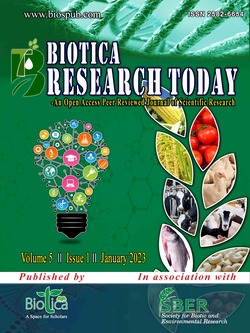
Eco-Labelling and Certification: A Marketing Tool for Fisheries and Aquaculture Products
Lokesh Pawar*
College of Fisheries (Central Agricultural University - Imphal), Lembucherra, Agartala, Tripura (799 210), India
Mayuri Nag
College of Fisheries, Govind Ballabh Pant University of Agriculture and Technology, Pantnagar, Udham Singh Nagar, Uttarakhand (263 145), India
Sheetal Choudhary
Dept. of Zoology, Government College Shahpur, Betul, Madhya Pradesh (460 440), India
DOI: NIL
Keywords: Aquaculture Sustainability, Eco-Certification, Eco-Labelling, Volunteer Label
Abstract
Ecolabelling is a tool that is being utilised more and more in support of sustainable aquaculture management worldwide. Ecolabels, according to its proponents, can provide financial advantages, increase fish farm transparency, and solve some of the ecological and socioeconomic issues associated with extensive marine finfish farming. Consumers may pick items that fit their views and preferences about eating thanks to food labels. It is crucial for producers to satisfy customer demand for credibility qualities including safety, nutrition, provenance, and sustainability as the market for farmed seafood expands. When stakeholders in the farmed seafood business are looking for methods to position their goods, they might look to both agriculture and marine labels because consumer preferences for credibility features are diverse. This article is a brief review of “Eco-labelling” in aquaculture industry, importance, challenges and status of eco-certification in Indian context with conclusion and suggestion which could be implemented for the sustainable growth of sector.
Downloads
not found
Reference
Blomquist, J., Bartolino, V., Waldo, S., 2015. Price premiums for providing eco-labelled seafood: evidence from MSC-certified cod in Sweden. J. Agric. Econ. 66(3), 690-704.
Iraldo, F., Griesshammer, R., Kahlenborn, W., 2020. The future of ecolabels. The International Journal of Life Cycle Assessment 25(5), 833-839.
Khan, I., Pandey, A., Kumar, P., 2018. Eco-Labelling of products in context to aquaculture. Agro-Economist 5(1), 23-29.
Potter, C., Bastounis, A., Hartmann-Boyce, J., Stewart, C., Frie, K., Tudor, K., Bianchi, F., Cartwright, E., Cook, B., Rayner, M., Jebb, S.A., 2021. The Effects of Environmental Sustainability Labels on Selection, Purchase, and Consumption of Food and Drink Products: A Systematic Review. Environment and Behavior 53(8), 891-925. DOI: https://doi.org/10.1177/0013916521995473.
Thøgersen, J., Haugaard, P., Olesen, A., 2010. Consumer responses to ecolabels. European Journal of Marketing 44(11/12), 787-810.
